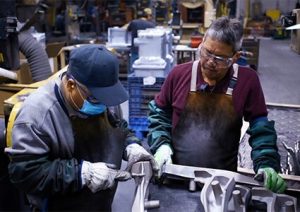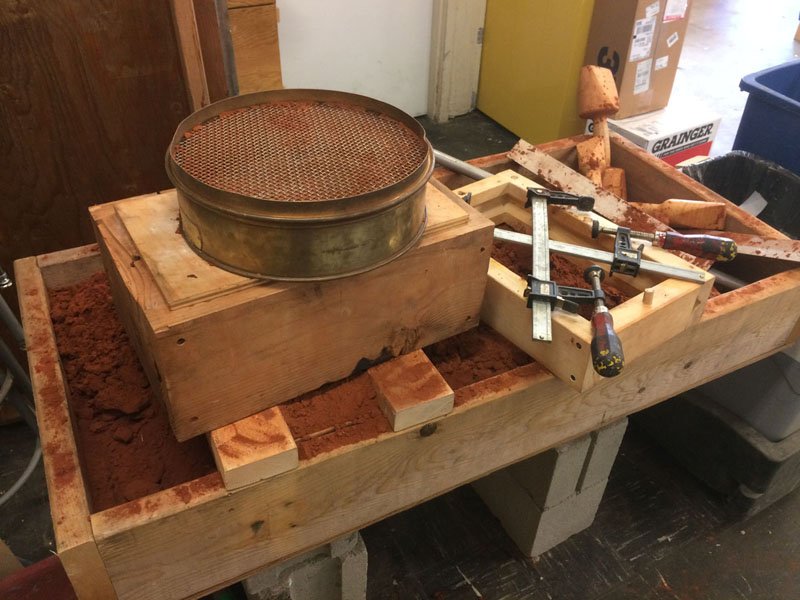Recognizing the Advantages and Innovations in the Aluminum Foundry Industry
The Aluminum Foundry sector plays a necessary function in contemporary production. Its lightweight homes significantly enhance fuel performance, especially in aerospace and automobile sectors. Furthermore, Aluminum's resistance to deterioration guarantees durability in different applications. As the market develops, technologies such as advanced recycling and additive production are reshaping production approaches. Checking out these improvements discloses not only the advantages but likewise the obstacles ahead for Aluminum factories in a rapidly transforming market.
The Lightweight Benefit of Aluminum
Aluminum's lightweight nature provides considerable advantages across numerous industries, especially in manufacturing and transport. Its reduced thickness enables the manufacturing of parts that are easier to install and manage, resulting in decreased labor expenses and boosted efficiency. In the vehicle market, lighter cars add to enhanced gas economic situation and reduced emissions, lining up with worldwide sustainability goals. In aerospace, the use of Aluminum decreases the total weight of aircraft, which is critical for improving performance and reducing operational prices.
In addition, Aluminum's lightweight homes help with innovative designs that were previously unfeasible with heavier products. This versatility enables manufacturers to develop complex forms and frameworks while keeping structural integrity. Generally, the light-weight advantage of Aluminum not only improves item performance but likewise drives developments in innovation and layout, making it a favored material in different applications.
Corrosion Resistance and Longevity
The Aluminum Foundry industry is renowned for creating materials with premium deterioration resistance, making them optimal for different applications. This property, incorporated with enhanced structural integrity, adds to the durable performance advantages that Aluminum elements supply. Consequently, sectors increasingly depend on Aluminum to fulfill requiring environmental problems without jeopardizing high quality.
Superior Corrosion Resistance
While numerous metals deal with significant challenges from ecological aspects, Aluminum stands out for its remarkable rust resistance, making it a favored choice in many applications. This residential or commercial property is mainly due to an all-natural oxide layer that bases on the Aluminum surface, offering an obstacle against wetness and corrosive representatives. Unlike various other metals that may rust or weaken gradually, Aluminum preserves its stability even in severe settings, such as seaside areas or commercial setups. Furthermore, its light-weight nature incorporated with rust resistance makes it perfect for applications in aerospace, vehicle, and marine sectors. Overall, Aluminum's remarkable longevity not just boosts product long life however also lowers maintenance expenses, presenting a compelling advantage for customers and suppliers alike.
Boosted Architectural Honesty
Designers and designers significantly recognize the value of improved structural stability in modern-day applications, where both corrosion resistance and durability are vital. Aluminum alloys, recognized for their lightweight homes, also display extraordinary resistance to corrosion, making them appropriate for harsh atmospheres. The innovative techniques utilized in the Aluminum Foundry market add significantly to generating components with improved durability. Advanced casting processes and alloy make-ups are tailored to satisfy particular performance requirements, ensuring that frameworks can endure extreme conditions without endangering stability. In addition, surface area treatments and finishings improve the life-span of Aluminum products, further mitigating damage with time. This concentrate on enhanced structural integrity not only prolongs the usability of materials however additionally lowers upkeep expenses, strengthening Aluminum's position as a material of option in various sectors.
Long-lasting Efficiency Benefits
Durable performance in Aluminum elements is largely credited to their superior corrosion resistance and sturdiness. Unlike many steels, Aluminum normally develops a protective oxide layer, which prevents rust and deterioration in different settings, consisting of industrial and marine settings. This intrinsic residential property substantially expands the life-span of Aluminum products, reducing upkeep and replacement expenses. On top of that, the light-weight nature of Aluminum boosts its applicability across sectors without compromising strength. The material's resistance to use and tear additionally adds to its integrity sought after applications, making it a suitable option for automotive, aerospace, and building and construction industries. As industries significantly prioritize sustainability and longevity, Aluminum's performance advantages line up with modern design requirements, solidifying its function in innovative manufacturing processes.
Environmental Impact and Sustainability
 As the Aluminum Foundry sector progresses, it increasingly focuses on environmental influence and sustainability, acknowledging the demand for liable techniques in the face of climate modification. Initiatives to reduce waste and power intake go to the leading edge, with many foundries taking on recycling campaigns to redeem Aluminum scrap. This not only lowers raw material usage however also significantly cuts down power expense, as recycled Aluminum calls for only a portion of the power compared to main production.
As the Aluminum Foundry sector progresses, it increasingly focuses on environmental influence and sustainability, acknowledging the demand for liable techniques in the face of climate modification. Initiatives to reduce waste and power intake go to the leading edge, with many foundries taking on recycling campaigns to redeem Aluminum scrap. This not only lowers raw material usage however also significantly cuts down power expense, as recycled Aluminum calls for only a portion of the power compared to main production.Furthermore, improvements in discharges manage modern technologies are being executed to reduce air pollutants, aligning operations with stricter environmental laws. Factories are additionally exploring alternative power sources, such as solar more info here and wind, to power their facilities sustainably. By fostering partnership with stakeholders, the market aims to develop ingenious remedies that improve ecological stewardship. Collectively, these efforts highlight a commitment to lowering the Aluminum Foundry's carbon impact while promoting a round economic climate within the production sector.
Advanced Manufacturing Techniques
 Revolutionizing production processes, the Aluminum Foundry sector is increasingly integrating sophisticated production strategies to enhance effectiveness and precision. Strategies such as computer numerical control (CNC) machining and additive manufacturing have actually emerged as vital elements in optimizing manufacturing process. CNC machining permits high-precision component fabrication, considerably lowering product waste and production time. On the other hand, additive production opens up brand-new avenues for complicated geometries and light-weight designs that were previously tough to achieve.
Revolutionizing production processes, the Aluminum Foundry sector is increasingly integrating sophisticated production strategies to enhance effectiveness and precision. Strategies such as computer numerical control (CNC) machining and additive manufacturing have actually emerged as vital elements in optimizing manufacturing process. CNC machining permits high-precision component fabrication, considerably lowering product waste and production time. On the other hand, additive production opens up brand-new avenues for complicated geometries and light-weight designs that were previously tough to achieve.Furthermore, the implementation of automation and robotics in Aluminum shops simplifies operations, reduces human mistake, and improves employee safety. These technologies facilitate a more responsive production environment, allowing makers to adapt quickly to market needs. The integration of innovative simulation software program even more boosts the style and testing stages, causing premium item top quality. Jointly, these strategies not only boost functional performance but likewise foster development, positioning the Aluminum Foundry industry at the forefront of modern-day production.
Developments in Reusing Procedures
The Aluminum Foundry sector is not just advancing in manufacturing methods yet is likewise making considerable strides in reusing procedures. Developments are emerging to Visit Website enhance the efficiency of recycling approaches, minimizing power usage and enhancing sustainability. Advanced arranging innovations, such as computerized optical sorting, enable the recognition and splitting up of Aluminum from other products with high precision. This causes a greater high quality of recycled Aluminum, which is vital for preserving the stability of the end products.
Closed-loop recycling systems are being implemented, allowing suppliers to reuse Aluminum scrap within their very own production processes. This minimizes waste and promotes a round economy. In addition, research study into new recycling methods, such as hydrometallurgical procedures, offers the possibility for recouping Aluminum from intricate waste streams. These developments not only add to reducing the carbon footprint of the Aluminum Foundry sector however additionally bolster its economic practicality in an increasingly environmentally aware market.
Applications Across Different Industries
Many markets are increasingly acknowledging the adaptability and benefits of Aluminum Foundry items, bring about extensive applications across markets such as automobile, aerospace, consumer, and building products. In the automobile market, Aluminum castings add to lightweight automobile designs, improving gas performance and efficiency. Aerospace suppliers utilize Aluminum components for their strength-to-weight proportion, necessary for airplane frameworks and components.
In building, Aluminum is preferred for its toughness and resistance to rust, making it ideal for window frameworks, roof, and architectural supports. Durable goods likewise benefit from Aluminum Foundry products, as seen in cookware, electronic devices, and packaging, where lightweight and recyclable products are vital.
The flexibility of Aluminum Foundry strategies permits for detailed layouts and precise requirements, accommodating the diverse needs of these markets. As a result, Aluminum Foundry items are becoming important to modern-day manufacturing procedures across various markets.
Future Trends in Aluminum Foundries
As industries proceed to advance, Aluminum shops are positioned to accept several essential patterns that promise to enhance performance and sustainability. One popular fad is the increasing fostering of digital innovations, consisting of automation and expert system, which enhance procedures and enhance quality assurance. On address top of that, the press towards sustainable practices is leading foundries to purchase reusing innovations, significantly decreasing waste and power intake.
 An additional arising pattern is the use of innovative alloys and products, satisfying the growing demand for long lasting and lightweight elements across different markets (Aluminum Foundry). Additionally, the integration of additive manufacturing techniques is prepared for to reinvent component design, providing modification and minimizing lead times
An additional arising pattern is the use of innovative alloys and products, satisfying the growing demand for long lasting and lightweight elements across different markets (Aluminum Foundry). Additionally, the integration of additive manufacturing techniques is prepared for to reinvent component design, providing modification and minimizing lead timesCollaboration with research study institutions is likewise expected to drive development, as factories look for to develop new processes and materials. Aluminum Foundry. Jointly, these trends indicate a transformative future for the Aluminum Foundry industry, aligning with broader goals of sustainability and performance
Regularly Asked Questions
What Are the Normal Prices Linked With Aluminum Foundry Production?
The typical costs related to Aluminum Foundry manufacturing consist of basic materials, labor, power, devices maintenance, and overhead expenses. These elements jointly affect the overall economic investment required for effective Aluminum casting procedures.
How Does Aluminum Contrast to Other Steels in Stamina?
Aluminum, while lighter than numerous steels, shows impressive strength-to-weight proportions. Contrasted to steel, Aluminum is less solid but provides superb corrosion resistance, making it a positive selection in applications where weight and durability are essential.
What Precaution Are in Location in Aluminum Foundries?
Safety and security measures in Aluminum shops typically consist of obligatory individual safety tools, air flow systems to regulate fumes, normal equipment maintenance, training programs for staff members, and adherence to strict security policies to lessen threats connected with molten metal handling.
Just How Is Quality Control Managed in Aluminum Spreading Processes?
Quality control in Aluminum casting processes entails rigorous assessments at numerous phases, consisting of basic material analysis, process monitoring, and end product screening. Techniques such as analytical procedure control and non-destructive screening assurance adherence to industry requirements.
What Qualifications Are Essential for Aluminum Foundry Distributors?
The relevance of certifications for Aluminum Foundry vendors consists of ISO 9001 for high quality monitoring, ISO 14001 for environmental administration, and industry-specific standards like ASTM and SAE, making certain conformity, security, and reliability in manufacturing procedures.
The Aluminum Foundry market plays an important role in contemporary manufacturing. The Aluminum Foundry sector is renowned for creating materials with premium rust resistance, making them excellent for various applications. Revolutionizing manufacturing procedures, the Aluminum Foundry market is increasingly incorporating advanced manufacturing methods to enhance effectiveness and precision. The Aluminum Foundry market is not just progressing in making methods yet is also making significant strides in recycling processes. As industries proceed to develop, Aluminum factories are poised to welcome several crucial fads that assure to boost effectiveness and sustainability.